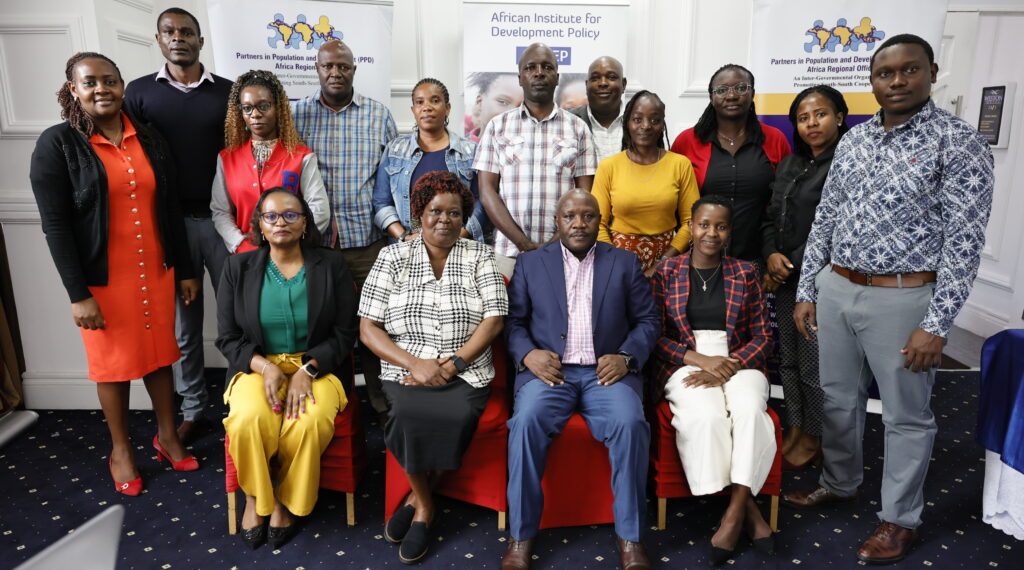African Institute for Development Policy (AFIDEP) and Partners in Population and Development Africa Regional Office (PPD-ARO), through the Advance Domestic Health Financing (ADHF) project has empowered civil society organizations and the media through ADHF smart advocacy trainings to champion policy changes that addresses critical challenges in the health sector.
According to Patrick Mugirwa, Programs Manager at PPD-ARO through the SMART advocacy approach, which emphasizes Specific, Measurable, Attainable, Relevant, and Time-bound goals, Civil Society organizations (CSO’s) and Media professionals drawn from the two Kenya’s health and science media associations- Kenya Environment & Science Journalists Association (KENSJA) and Media For Environment, Science, Health and Agriculture (MESHA) -have been the equipped with strategic tools to enable them drive impactful reforms aimed at improving healthcare delivery across the country.
“Stakeholders trained under the ADHF SMART advocacy framework in 2023 are recording remarkable achievements in implementing their objectives. Their advocacy efforts have resulted in substantial increases in healthcare budgets, timely funding releases, and better resource allocation at both national and county levels,” Mugirwa said.
Through the SMART advocacy efforts of CSO’s Kenya was able to urgently address and resolve a Vaccine Shortage crisis in June 2024, through a collaborative effort of the Health NGOs Network (HENNET) and the Media.
Hennet utilized strategies learned from SMART advocacy training, by mobilizing Media, caregivers and community voices and engaging key decision-makers with targeted messaging.
The Hennet vaccine advocacy resulted to rapid allocation of Kes 1.25 billion by the National Treasury, ensuring life-saving vaccines reached underserved populations.
Another stakeholder, Penda Health, in collaboration with the Clinton Health Access Initiative (CHAI), tackled a backlog of Kes 8.4 billion in pending claims from the then National Hospital Insurance Fund (NHIF) now Social Health Authority (SHA) to private healthcare providers.
Penda Health and CHAI partnered with the Kenya Healthcare Federation (KHF) and the Rural Private Hospitals Association, their advocacy led to the release of funds supporting programs like Linda Mama and Edu Afya, sustaining critical services for vulnerable populations.
Similarly, Deutsche Stiftung Weltbevölkerung (DSW) Kenya’s efforts in Kwale County highlighted the critical need for investment in adolescent sexual and reproductive health (ASRHR).
Through engagement of adolescent champions with the county’s executive and legislative leadership, DSW Kenya advocated for increased resource allocation for ASRHR during the development of key budget documents, including the County Integrated Development Plan (CIDP), Annual Development Plan (ADP), and County Fiscal Strategy Paper (CFSP). As a result, ASRHR funding saw a 32percent increase in the financial year 2023/24, rising to Kes 132,713,223 from Kes 100,725,908 in FY 2022/23. This achievement underscores the power of community-driven advocacy in securing sustainable investments in youth health.
In Nairobi County, through SMART advocacy approach the Centre for the Study of Adolescence (CSA) secured a 2percent increase in the health budget, raising allocations from Kes 8.1 billion to Kes 8.9 billion for FY 2024/25. This included Kes 22 million dedicated to primary healthcare.
While Laikipia County, the Laikipia County Civil Society Forum (LACCSOF) advocated for an increased health budget, including reproductive health funding, achieving a modest yet meaningful boost from Kes 2.641 billion to Kes 2.715 billion.
Taita Taveta County through the Taita Taveta CSOs Movement (TTCSOM) championed a Kes 400 million health budget increase, with dedicated allocations for reproductive, maternal, neonatal, child, and adolescent health services.
The AFIDEP/PPD-ARO ADHF project’s success stories underscore the potential of SMART advocacy to transform healthcare systems.
ADHF smart advocacy approach aims at strengthening the capacity of state and non-state actors, to be able to advocate and unlock resources critical to improving health outcomes and highlight the importance of investing in advocacy capacity as a cornerstone of sustainable health reform.













